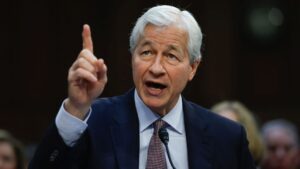Welcome to Extreme Investor Network
At Extreme Investor Network, we strive to provide you with the most cutting-edge, exclusive business news that you won’t find anywhere else. Today, we delve into the latest developments surrounding JPMorgan Chase and its ongoing battles with regulators.

JPMorgan Chase recently made headlines when it was revealed that the Consumer Financial Protection Bureau is considering taking action against the bank for its involvement in the Zelle digital payments network. The bank is accused of allowing criminal accounts to remain on the platform and failing to compensate scam victims. In response, JPMorgan hinted at potential legal action, signaling a significant shift in the traditionally cooperative relationship between banks and regulators.
These developments highlight the growing divide between banks and regulators in the aftermath of the 2008 financial crisis. With the current regulatory landscape becoming increasingly contentious, banks are facing mounting pressure to comply with stricter rules and regulations that could impact consumers.
The Battle Over Fees
This year has seen a series of regulatory efforts aimed at reducing fees for consumers and increasing capital requirements for banks. The Basel Endgame proposal, in particular, poses a significant threat to large financial institutions, requiring them to hold more capital for risky activities. JPMorgan and other industry leaders have voiced concerns about the potential impact of these regulations on consumers and have actively lobbied against them.
Meanwhile, JPMorgan’s involvement in the Zelle network has come under scrutiny, with reports of fraudulent transactions and inadequate compensation for victims. The bank’s response to these accusations has raised questions about its commitment to consumer protection and regulatory compliance.
Dimon Takes the Lead
Under the leadership of CEO Jamie Dimon, JPMorgan has emerged as a powerful force in the banking industry, challenging regulators and advocating for industry-friendly policies. Dimon’s influence and reputation have allowed the bank to take a more aggressive stance against regulatory measures, sparking debates over the balance between financial stability and consumer protection.
As the regulatory landscape continues to evolve, the future of banking regulation remains uncertain. With ongoing legal battles and political challenges, the relationship between banks and regulators is likely to face further scrutiny in the coming months.
Stay tuned to Extreme Investor Network for the latest updates on this developing story and more exclusive business news.

